Something was going DOWN in the UP, but something was definitely UP with S2. This side blog is for gathering clues and theories as I find them.
Don't wanna be here? Send us removal request.
Video
youtube
Given the nature of the Internet, you may need this one day. It’s Amanda Palmer doing the “You were right” dance.
(What, you don’t do the “You were right” dance? I thought all married people did the “you were right” dance. Probably you are not married.)
993 notes
·
View notes
Text
Y’ALL I JUST FOUND SOMETHING WILD:
I figured this out by pure accident because musically, I’m not a big fan of Tori Amos’s singing style (I’m sorry 🙁, besides the point though!), so I pulled up the original instead to put on my playlist.
And GUYS. I don’t think “A Nightingale Sang in Berkeley Square” is about them at the Ritz together in the 21st century, or at least not at first…
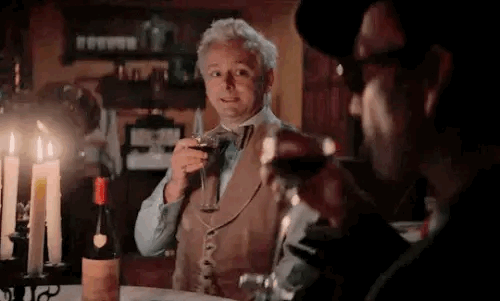
It’s about this.
“A Nightingale Sang in Berkeley Square” originally came out in 1940 by Vera Lynn, one year before Crowley pulled the most romantic ass stunt Aziraphale had ever seen and, let’s be honest, the vibes uh… changed. I mean there was a reason the rumor of them being an item spread in hell around this time.
And that’s not all, the song was actually meant to be part of a musical, on the West End. The place where they made a fond memory together for the first time in nearly a hundred years, took care of each other, trusted each other. Hell, where Crowley and Aziraphale, both friends of the theatre in different ways, probably heard this song about causing the impossible and falling in love just a year prior for the first time.
Yah so I’ve FULLY drank my own koolaide and completely believe that they already associated this song with each other. Not only saw it as a fond reminder of that night in 1941, but the quiet, gentle reality they might have together someday. But they wouldn’t DARE say that out loud, wouldn’t be ridiculous enough to let themselves hope for it.
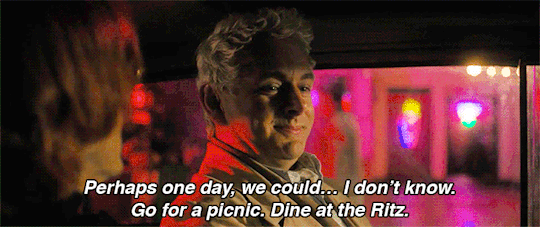
I think this was Aziraphale breaking the unspoken rules and acknowledging this thing they share. Him saying “I know, I see you. I hope so too.”

7K notes
·
View notes
Note
Hi Mr. Gaiman)
I have a question regarding Crowley and Aziraphale not being able to resurrect humans. It seemed like the demons killed Mr. Brown, but than we see him alive and well at the end of the last episode. I thought Crowley brought him back to life after escorting Maggie and Nina out. Was I wrong to think that? what actually happened?
I know you get a lot of questions and might not get to this one. either way thank you in advance and have a good day)
P.S. I loooved the second season and can’t stop thinking about it.
Mr Brown had not been killed. He was taken by the demons and stashed away to be dealt with later -- Shax was still intimidated by Crowley's declaration that the demons could not kill civilian humans at that point.
3K notes
·
View notes
Text
Aziraphale's memory, Jimbriel, the Metatron, and forgiveness
There's a bit of fanon that goes like, Crowley can't believe Aziraphale loves him even were Aziraphale to say so, because Aziraphale is an angel and angels love everyone.
S2 kind of explodes that one. (Which, I mean, continue to use it if you like; fanon is fanon and getting jossed happens to the best of us.)
Not long after his arrival in the bookshop, Jimbriel says to Aziraphale, "You're funny. I love you."
"Oh. Thank you," says Aziraphale, with just a tiny bit of gratification even. And then he says "I..." and can't finish the sentence. He can't return the sentiment with I love you too. He remembers too much, and isn't ready to forgive or forget, much less love.
His reticence gets followed up on during the Job minisode. "You were awful once," he tells Jimbriel flatly. "Really, really awful." Notably, he's not saying this because of Gabriel's treatment of him -- but because of Gabriel's role in Job's story.
I don't think Aziraphale's opinion of Jimbriel -- a lorge nuisance who used to be a horrible clueless purveyor of cruelty -- shifts until the demon attack on the bookshop. Before Jimbriel goes out to Shax, Aziraphale doesn't protest that Jimbriel is too -- too anything, too valuable or too angelic or too important -- to save. He falls back on his own guardian role, telling Jimbriel that he said he would protect him (did he? did he, actually? I'm not sure he did) so he will.
Jimbriel tells him there's no need, he's going out -- and we get quite a long shot of Aziraphale's face, which reads to me as both surprised and somewhat unwillingly impressed. Aziraphale can respect self-sacrifice.
I think this is why he gives Gabriel and Beez their way, deferring to their wishes. He's learned that with a little Jim and a dash of love for seasoning, Gabriel won't be awful, and he's willing to trust that... and forgive what he can of Gabriel's derelictions.
Now then.
In season 1, a desperate Aziraphale approaches the Metatron to beg him to save the world. The Metatron brushes him off in the cruelest way possible. He's Gabriel -- but worse, because he's not clueless, he seems to know exactly what a nuclear exchange is and the devastation it will cause, he just doesn't care. We can see Aziraphale's heart breaking, right there onscreen.
I'm on record multiple times thinking that Aziraphale is not taken in by the Metatron, or the Metatron's coffee, or the Metatron's job offer, or the Metatron's offer of re-angeling Crowley, or any of it. This is another reason I think that. Aziraphale can hold a grudge, at least subliminally, and he's got one tall leftover grudge against the Metatron.
There's no reason at all for Aziraphale to think the Metatron has changed since Armageddon't. There's been no Jimbriel phase to change Aziraphale's mind. There is no apology from the Metatron. Coffee and job offers are no kind of atonement!
Crowley's memories may have been tampered with. Aziraphale's haven't. He knows what the Metatron is, and he knows perfectly well not to trust him. That's my story and I'm sticking to it.
166 notes
·
View notes
Text
The thing is. The thing is… a car is no place for plants to grow. Even if you carry the plants into a bookshop sometimes. They still need… space. And patience. And love. The plants are crowley.
4K notes
·
View notes
Text
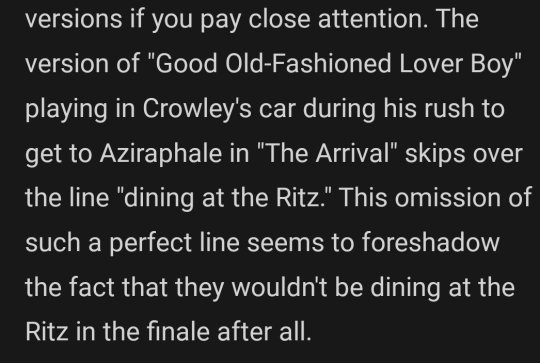
I'm in Neil Gaiman's walls
#good omens#gos2 spoilers#aziraphale#crowley#loose clues#parallels and themes#details#wheezing about this 😭
5K notes
·
View notes
Text

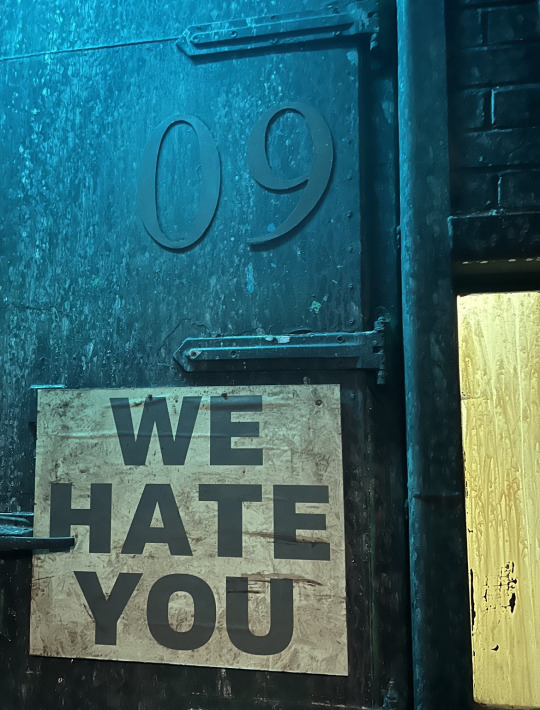
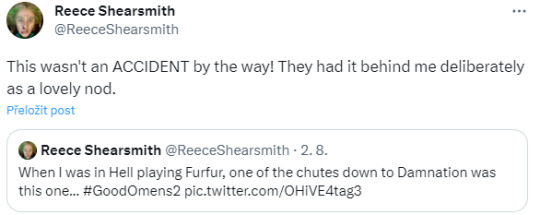
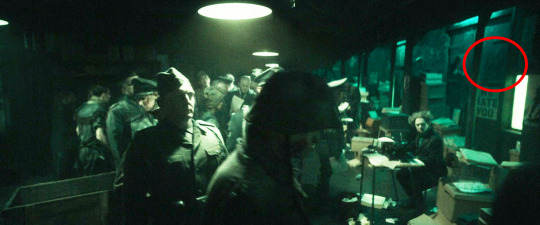
(Reece Shearsmith (Furfur) and Steve Pemberton (Mr Glozier - one of the Nazis) made together a brilliant (if a bit disturbing :D) tv series called Inside No. 9)
4K notes
·
View notes
Text
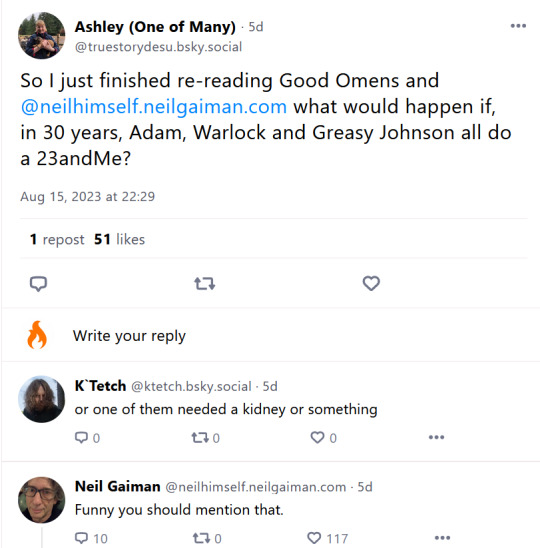
I have pondered on this many a time before and came to the conclusion that the whole Find-the-Lady game that happened with the babies was God's misdirection to drop off the Messiah when no one was expecting it, with all eyes on the Antichrist. After all "of that day and hour knoweth no man, no, not the angels of heaven, but my Father only." (Matthew 24:36)
Let me lay out my brain logic:
Johnson is a name that comes from Son of John. John means "God is gracious". God-is-gracious-son.
The Christ part of Jesus Christ comes from the Greek word Christos which literally translates to anointed one. Anointing is generally done with oil. Grease is "a thick oily substance". So we have Anointed God-is-Gracious-son.
Jesus was famous for hoarding fishermen who became fishers of men and also for doing fishy miracles. Greasy Johnson won prizes for his fish.
The Antichrist was prophesied to be a rival to Christ - Greasy Johnson and the Johnsonites were rivals to the Antichrist and the Them.
Based on the Nativity stuff, Jesus was born via a human the first time around so it makes sense for the same to happen second time around (unlike Adam, as far as we know - Sister Mary asked and we never got an answer to it and he turned up in a basket)
From what I remember, when Neil and Terry mentioned the potential sequel, it was going to involve America. In the Nativity, Jesus and his family had to go back to the place where his human parents came from. If Greasy Johnson does a DNA test, it will lead him back to America and to Harriet Dowling.
2K notes
·
View notes
Text
When I was trawling through pictures of the library used for Dalrymple's office, I noticed that there was a different painting from the one in the show. Looking a bit closer, the one in the show appeared to be a patient having a blood-letting by a doctor:
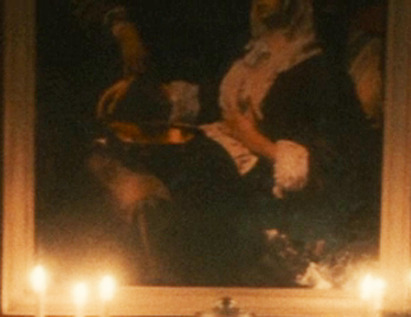
Because I'm a nosy old bean, I asked Mickey Ralph, one of the graphic design team, about it and she was kind enough to reply :)

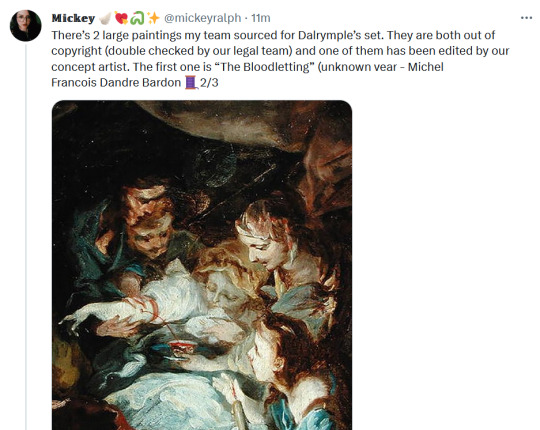
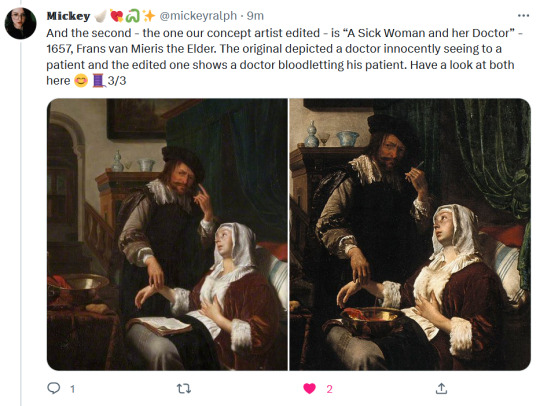
So this is the full image of the painting that Mr. Dalrymple has above his fireplace. Speaks measures about him as a holier-than-thou playing-God character, doesn't it?
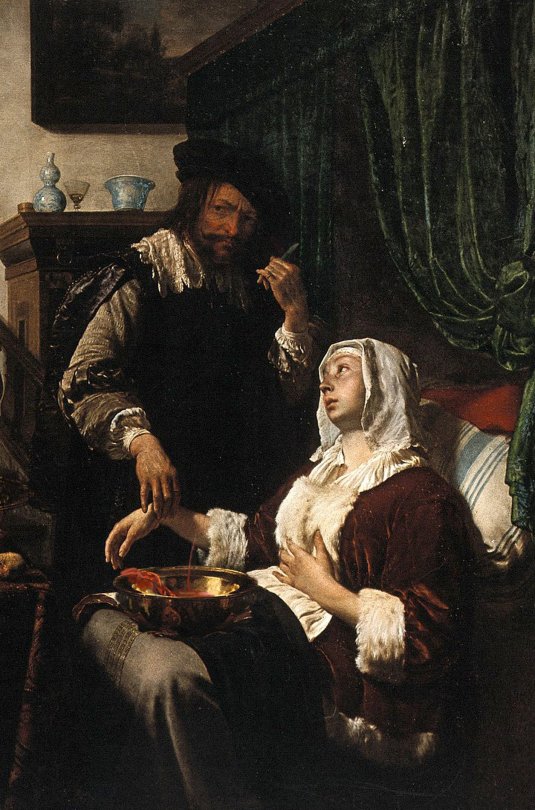
73 notes
·
View notes
Text
Guys i have a theory
People keep talking about how much they mention memory wiping this series and I definitely think that’s important - i just dont think people are applying it to the right character.
Because Gabriels one downfall that led him to be demoted was that he didn’t want another armageddon. and what was the entire plot of the first series/book? Crowley and Aziraphale Stopping Armageddon.
Obviously heaven doesn’t want that to happen again with the second coming - that would make it seem like theres some sort of institutional problem. So even if they don’t fully wipe his memory, they might remove little bits and pieces.
64 notes
·
View notes
Text
Give me coffee or give me death
I don’t believe in the Coffee Theory per se. I think the whole ‘drugged coffee’ thing is a bit too spy movie to be in Good Omens, but- BUT
The fact that that coffee is in the intro;
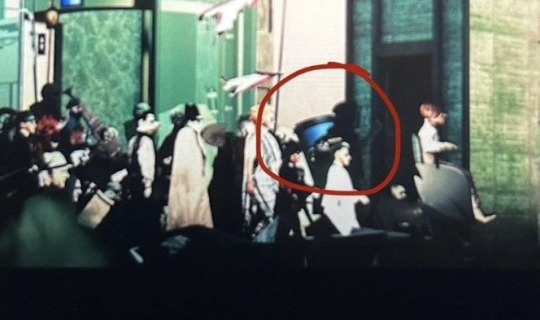
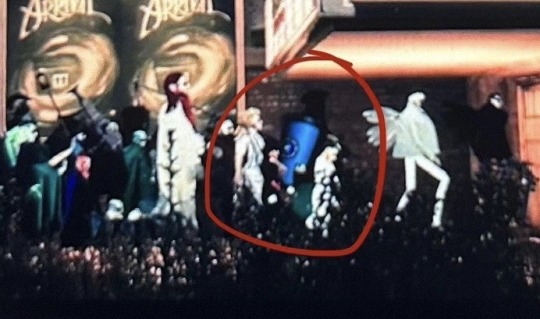
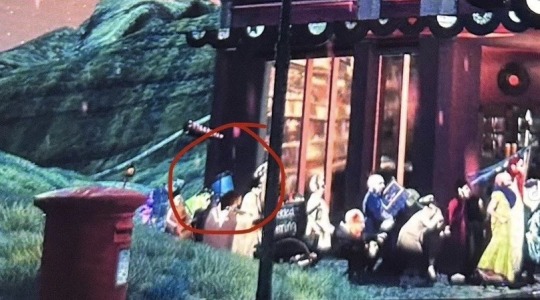
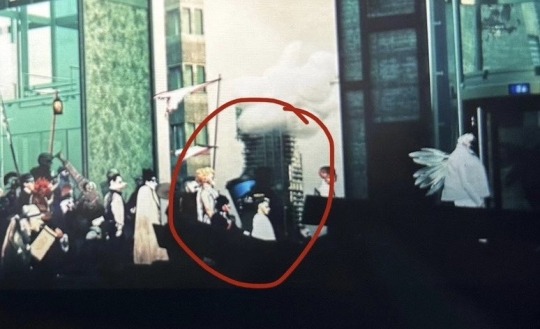
The fact that you can see The Metatron in line, waiting for his turn, BEFORE he gets into the coffee shop, like if he was an out of place detail you were supposed to notice and ask yourself questions about;
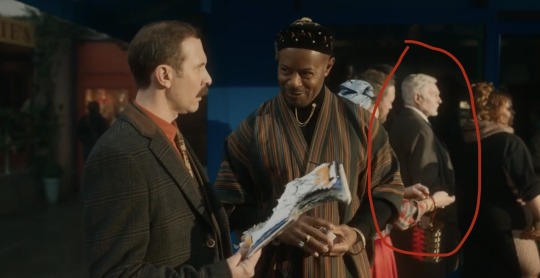
The very long and apparently superfluous dialogue about choosing coffee instead of death, and how “predictable” that is;
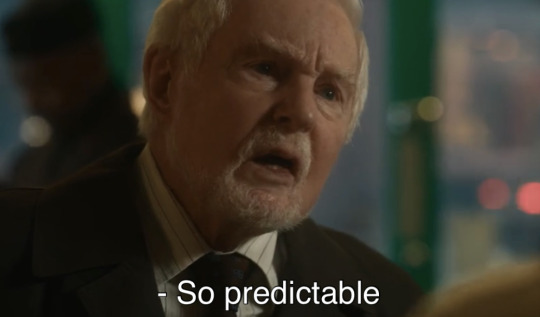
The fact that for two seasons we NEVER see Aziraphale drinking coffee, like that’s not his thing, that’s Crowley’s thing, he’s the “six-espresso-in-a-big-cup” guy, Aziraphale drinks hot chocolate or tea, and we have to assume The Metatron knows that, because he went into that coffee shop and asked for such a specific thing that makes you think that’s something he chose specifically for Aziraphale (who still doesn’t drink coffee, so why?).
He looks reluctant at the idea of drinking it at first
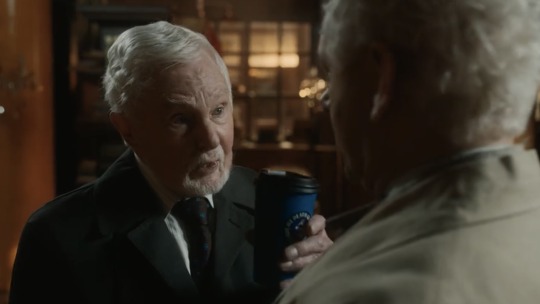
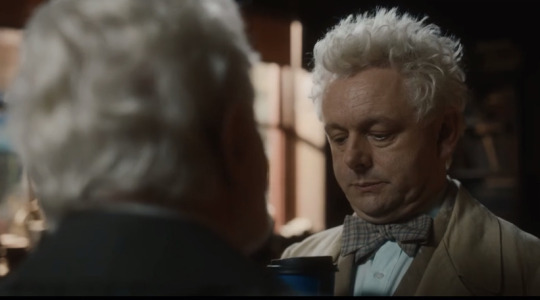
but he accepts it out of courtesy, I presume, and this is the face he makes when he tries it:
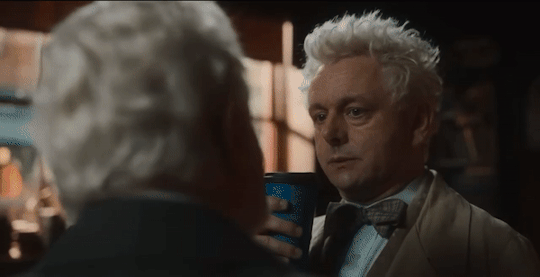
Even he is surprised he liked it. He’s on Earth since 6000 years, so we can assume he tried coffee before and chose not to drink it. He’s either lying about liking it out of courtesy, or this is the only coffee he’s ever enjoyed, and The Metatron knew he would have liked it and chose that coffee on purpose.
So, the coffee is either important as a physical element, as something that had an actual effect on Aziraphale and changed him somehow, or it’s important in its metaphorical significance. In Good Omens almost everything is metaphorical, so the second option is very likely.
Now, what’s the coffee supposed to represent? The only certain thing we know, is that the coffee is something The Metatron offers Aziraphale, so it probably represents the offer he’s about to make.
Considering the whole “Does anyone ever choose death?” conversation, considering the fact that we don’t know how the conversation between The Metatron and Aziraphale went, we only know the version Aziraphale chooses to tell Crowley, and considering The Metatron is the angel that decided to erase Gabriel’s memory just because he said “nah” about Armageddon 2.0 and Aziraphale is the traitor, the one who stopped the Armageddon 1.0, so The Metatron has no reason to be friendly with him, my question is:
Did Aziraphale actually have a choice?
Or the alternative was worse than leaving Crowley and the bookshop?
Was it actually coffee or death?
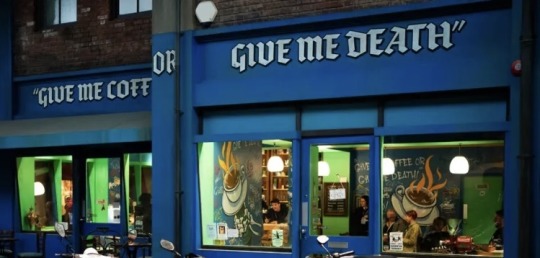
2K notes
·
View notes
Text
“One prince of heaven falls its a good story. Two fall and it’s an institutional problem”
So. What “Prince of Heaven” was he talking about?
Your mind might go to Lucifer, but, I don’t think Lucifer’s title was “Prince of Heaven.”
Lucifer was “Lightbringer” he was “The Morning Star” he was not a “Prince of Heaven” that title was reserved for either Michael specifically, or, the archangels in general
One archangel has fallen. So no more can
The only archangel not mentioned is Raphael
Crowley was a high-ranking angel capable of accessing very important files before he fell
Is
Is Crowley Raphael?
Is Crowley literally, actually, straight up Raphael?
1K notes
·
View notes
Text
Is Maggie bad at spelling for reasons that have nothing to do with humans sometimes being bad at spelling? Is it supposed to tell us something, since demons are also bad at spelling?
Also, do we think Crowley doesn't care for books because he thinks human philosophy is not applicable to him and he has other things to think about, or is it because he is not linguistically talented in the same way as Aziraphale is, because he is a demon? Or, because he makes stars and such, he's more of a STEM-minded sort?
So Crowley obviously wants to pretend that hes not equally involved in the bookshop. So he uses that to tell Shax he can't let her in. But I frankly wonder if that would even work because of the personnel involved; if of course, he actually can make those determinations now because he is taking responsibility for the shop in Zira's absence. However, given that Zira can make it so that Shax can't get in the car without permission, I wonder if Crowley can now make it so the *angels* can't get into the bookshop?
But then, humans can invite demons in. So maybe humans are exceptions to the rule in general, and can invite either in, because it's their world, or something like that?
19 notes
·
View notes
Text
If we DO ever get a Good Omens season 3 (and fingers crossed we will) then using the Second Coming as the narrative device to facilitate the final culmination of Good Omens' ideology and message is brilliant, actually.
Because the Second Coming IS NOT another Adam situation. And, contrary to the misconceptions I've seen, It IS NOT about Jesus being born again as a baby, etc, etc.
THE SECOND COMING. QUITE LITERALLY refers to THE LAST JUDGMENT.
As in. The SAME Last Judgment Michelangelo painted on the walls of the Sistine Chapel. As in - THE JUDGMENT of the Living and the Dead. THE LAST, FINAL, ETERNAL JUDGMENT.
It's the WHOLE thing Armageddon was leading towards. Book of Revelation speedrun: the world ends, everyone dies, and then they get resurrected again to be judged by JESUS himself. He will flick through the Book of Life (WINK WINK WINK DO YOU SEE HOW LOUDLY I'M WINKING AT YOU???), and if your name is there he will go "oh nice you deserve eternal paradise! :D" and if your name is ERASED from the Book of Life he will go "oh no, sorry, you go to the lake of fire for eternity now D:" (except apparently in Good Omens lore it'd just DOOM YOU TO NON-EXISTENCE FOREVER???)
And if you THINK about it, The Last Judgment is the ultimate manifestation of moral absolutism. No shades of gray, no chances. Just BLACK, and WHITE. Never mind that you're like Wee Morag and Elspeth, who are forced to do "bad" things because of circumstances. It's either you pass Judgment Day, or you burn (or disappear forever.) And the way THINGS are going in the Good Omens universe? I don't think there's ANYONE "good" enough to be "saved." Not Crowley, not Aziraphale. Hell, not even the Archangels themselves.
So it provides a PERFECT opportunity for Aziraphale and Crowley to UPEND that SYSTEM entirely.
I think that's what Crowley and Aziraphale would do in s3: establish a new kind of system in which angels and demons have free will to determine the right (or wrong) choice.
Giving them the APPLE, so to speak.
And then they'll go off to retire in a cottage, together at last.
6K notes
·
View notes
Text
You're a dark horse, Mr. Fell!
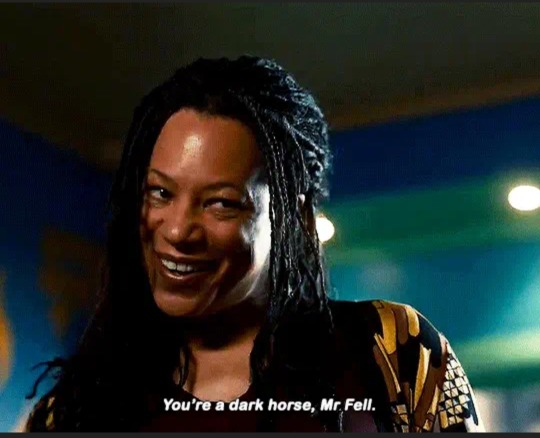
I'm no native speaker and although I am under the impression that my knowledge of the English language isn't that bad, I hadn't heard the expression of "being a dark horse" before. From the context in which it was said by Nina I could deduce it's meaning and at first I didn't really think it was relevant in any way. Just an expression I hadn't heard before, totally fitting from Nina's point of view.
But then Crowley used the same phrase to describe the multi-talented Jane Austen in the pub scene and I was surprised that two different characters used these exact same words to describe two different people. I started wondering if there could me more to it. And knowing Neil Gaiman, there probably is. (I'm just not smart enough to figure it out)
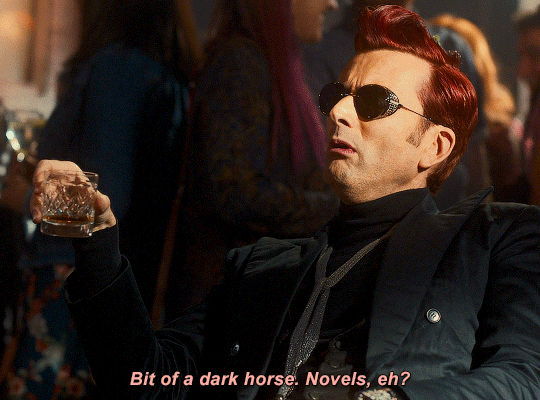
The next thing I realise is, that there's an actual dark horse in Aziraphale's book shop! It's a figurine of one of the two Marley Horses by the French sculptor Guillaume Coustou. Crowley noticeably uses it to store his glasses - we see him put them there and grab them back multiple times throughout the season - and in episode one the later vanished plate of Eccles cakes is placed right next to it.
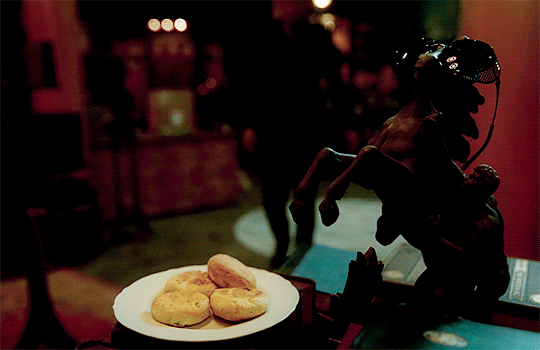
So all of this really REEKS as if there's more to it! But what exactly?
Because, as I mentioned, I'm not a native speaker, I looked up the meaning of "being a dark horse" online in the Cambridge Dictionary. This is what I found:
a person who keeps their interests and ideas secret, especially someone who has a surprising ability or skill (that was the meaning I deduced after hearing Nina calling Aziraphale a dark horse because of the whole naked man business)
a horse or a politician who wins a race or competition although no one expected them to (Aziraphale being - seemingly - promoted to Supreme Archangel of all Heaven by the end of season 2 wasn't exactly on my bingo card)
a person who is not expected to succeed in or unexpectedly wins an election, race of other competition (could this be a hint that the Metatron underestimates Aziraphale? I mean, he used to guard the gate to Eden with a flaming sword and apparently he's fought in a war and blew up demons with his halo, so...)
So what to make of all of this? I don't know. As I said, I'm not clever enough for this. But I would be surprised if this dark horse was just a red herring.
Please feel free to hit me up with your ideas.
397 notes
·
View notes
Text
Season 3 Good Omens theory
I'm going to need all your attention because this theory is difficult to explain since I'm going to have to analyze the Bible and the book of Revelation to make it understandable. I'm going to make some huge shortcuts otherwise we'll never get to the end of this, and I'm too lazy to make a thread about it on Tumblr.
As we realized in the Season 2 finale, the next plan from paradise is the second coming… it's no secret that believers think about the return of Christ, it's even in the apostles' profession of faith.
"1. I believe in one God, the Father Almighty, Creator of heaven and earth,
and in Jesus Christ, his only Son, our Lord
who was conceived of the Holy Spirit, (and) (who) was born of the Virgin Mary;
(He) suffered under Pontius Pilate, (He) was crucified, (He) died, (He) was buried, (He) descended into hell;
on the third day, (He) rose from the dead;
ascended into heaven, (He) is seated (variant: He sits) at the right hand of God, the Father Almighty;
from where He will come (variant: He will come from there) (to) judge the living and the dead.
I believe in the Holy Spirit (variant: in the Holy Spirit)
in the Holy Catholic Church (Protestant version3,4: I believe in the Holy Universal Church), (in) the communion of saints,
the remission of sins,
the resurrection of the flesh
eternal life.
amen.
Yes, you read that right: descended into hell. So he spent 3 days in hell? Why would he do that? His sacrifice should have been enough to save humanity. So if he did spend a vacation in hell, he had to suffer three more days to atone for the sins of mankind. Three days in hell… he must not have liked it. Because it wasn't supposed to happen in the first place, his last words at the time of his sacrifice were: "It is finished. (John 19:30) Jesus' last words express the end of his suffering and the fulfillment of all the work his Father had entrusted to him: preaching the Gospel, performing miracles and obtaining eternal salvation for his people. The ransom for sin had been paid. So why did he go to hell ?
And then you think, why the fuck are you talking about this? And I answer you: wait and read. You subtly noticed in the series that God loves the number 7. And you have no idea how true that is.
And did you know that Jesus was a goat? More precisely, a goat with 7 horns and 7 eyes. No, I'm not on drugs, it's actually in the Bible. Revelation 5:6: "Then I saw, in the midst of the throne and the four living creatures and in the midst of the elders, a lamb standing as if offered as a sacrifice. It had seven horns and seven eyes, which are the seven spirits of God sent out into all the earth." John (jean) sees a lamb with 7 horns and 7 eyes.
If you knew that, then you probably know that one of the major themes of the book of Revelation is the book of the seven seals. A book that can only be opened by ….. JESUS. And what happens if JESUS opens the book of the seven seals? The apocalypse.
Isn't the Antichrist supposed to trigger the apocalypse? No, and do you know why? Because in the Bible, the antichrist doesn't exist. Well, there is, but not in the form we think. In the Bible, it's a term for atheists. Disappointing, isn't it? (I know that in Islam there's mention of Al-Dajjâl, false messiahs who correspond to the Antichrist of evangelical Protestants. But I'm going to concentrate on Christianity because I'm afraid of making a mistake).
So why in good omens is Adam the antichrist? Because it takes two goats for a sacrifice. One to be sacrificed and the other to be released into the wild, the scapegoat, the one who takes on the sins. And now you're thinking, the scapegoat is Jesus. Except that Jesus was sacrificed. Adam is the scapegoat.
Huge misunderstanding that will be repeated: Saint John relates a vision in which he sees, in the right hand of the One who sits on the throne, a rolled-up book, written on the front and back, which is sealed with seven seals. Rev 5:1. Then he sees as it were a slain Lamb, who came and took the book from the right hand of Him who sits on the throne. Rev 5:6-7. And remember, Jesus is the lamb. Jesus will have to be sacrificed again to trigger the apocalypse. And let's imagine Jesus realizes he's been lied to and that he wasn't the scapegoat. I don't think he'd be too happy about that, so he's either not going to trigger the apocalypse, or he'll become the antichrist, destroy God, heaven and hell, and decide to rule the world. ( All for freedom and for pleasure Nothing ever last forever Everybody wants to rule the world So glad we've almost made it So sad they had to fade it Ev'rybody wants to rule the world).
You think this is the end ? Absolutely not mouhahahaha. Everything repeats itself, if Jesus becomes the scapegoat, someone has to die as a result. No happy ending in my book. Sorry.
Anyway, it was fun coming up with this theory. Now all I have to do is wait and see if I got it right on at least one point.
@neil-gaiman I hope the strikers win their case, because if they don't, it'll be the end of the magnificent projects that have kept us dreaming until the very end.
54 notes
·
View notes
Text
I'm probably not the first to find this, but according to Wikipedia, an Eccles Cake is also known as: Squashed Fly Cake, Fly Cake, Fly Pie. So, are the disappearing cakes a hint at the importance of the fly?
56 notes
·
View notes